Amid all the expansive talk of Burma being on the cusp of an economic boom, with special business zones, ports, railways, factories and half a million tourists queuing at the door, there’s one very vital ingredient missing—electricity.
Burma has a population similar to Thailand but less than 8 percent of its neighbor’s electricity generating capacity.
Burma has about 2,000 megawatts (MW) capacity, Thailand has 26,000 MW.
Rural Laos, with a population of only 6 million, has a generating capacity equal to Burma. So how will all the plans for development billed for this year and next be powered?
It’s a question that Burma’s Energy Minister Than Htay seems unable to answer beyond saying it would be in the hands of the private sector.
In recent months the Burmese government has blocked construction of about 7,600 MW of new generating capacity—the Chinese-led Myitsone hydroelectric dam on the Irrawaddy River, with a 3,600 MW capacity, and a 4,000 MW coal-fueled plant planned as the engine to power the Dawei (Tavoy) special economic zone on the southeast coast.
Burma is notorious for power blackouts and hundreds of businesses from backyard enterprises to major hotels and factories have to use their own generators fueled by expensively imported diesel.
Burma’s aging and small refineries are able to supply only about one third of current daily national demand for diesel and gasoline, the country's energy minister told Reuters.
No more than 25 percent of Burma’s population is hooked up to the country’s dilapidated electricity grid. Some new transmission lines are reportedly due to be completed this year, but even then the grid is mainly confined to a corridor between Rangoon and Mandalay.
“Burma has acute electricity supply problems and it is going to take time and cost a lot of money to expand both the supply and the transmission grid,” Bangkok-based energy industries consultant-analyst Collin Reynolds told The Irrawaddy this week.
“There is, or was, over 9,000 MW of new capacity being built via a number of big hydro dam projects, but the fate of these must be in doubt after the suspension of the Myitsone system, and in any case about 85 percent of this projected capacity was scheduled for export to China and Thailand.
“Curbing socially and environmentally disruptive big dams is understandable but less so is the halting of the coal plant for Dawei,” said Reynolds.
“Coal is plentiful and less subject to the price fluctuations of oil. Burma has plenty of gas but most of it is committed to long-term export contracts.”
Energy Minister Than Htay said in January that those contracts, with Thailand and China, will be honored. But he told Reuters that Burma has reserves of 22.5 trillion cubic feet—a figure not independently verified—and from 2013 more gas will be committed to domestic power generation.
The block on a coal plant for Dawei goes against a trend towards more use of coal for electricity generation in Southeast Asia as countries seek to reduce oil use and struggle with gas shortages. And there is no guarantee that Dawei will get a gas supply adequate to fuel a 4,000 MW plant.
Neighbor Malaysia is building two 1,000 MW coal-powered plants after 2011 saw electricity shortages there due to gas supply problems.
Both Malaysia and Thailand currently rely on gas, both domestically produced and imported, to fuel about 70 percent of their electricity generation. In Thailand’s case, about one third of its electricity is fueled by Burmese gas.
Burma’s neighbor Bangladesh also suffers from acute power shortages, caused by an over reliance on an inadequate domestic gas supply. But protest strikes by frustrated factory workers and strong pressure from a garment industry being strangled by blackouts has jolted the Bangladeshi government into action. Among new infrastructure plans is a 1,400 MW coal-fueled power plant to be built just a cross border from Burma at Cox’s Bazar. The developer of the US $2.5 billion plant is Malaysia’s state electricity company Tenaga Nasional Berhad.
The Burmese government has signaled that three other special economic zones in addition to the Dawei project are on the drawing board, including Thilawa, south of the Rangoon, and around Kyaukphyu, where China has been building an oil transhipment port and where the pipelines to carry crude oil and gas through Burma into southwest China will start.
The lead construction firm appointed by Naypyidaw for the Dawei economic zone, Bangkok-based Italian-Thai Development, is due to take its project on a road show to South Korea at the end of this month to seek investors for a petrochemicals complex and a steel-making factory. Without guarantees on electricity supply, it’s hard to see businesses making firm commitments.

